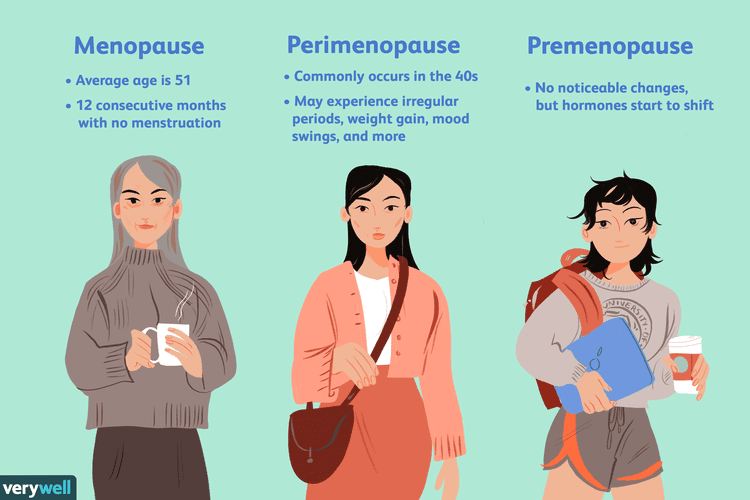An Overview of Menopause

- February 8, 2023
A Natural Stage That Can Happen at Different Times
Menopause is the natural biological process that causes your menstrual periods to end. For most females, it happens between the ages of 40 and 58. It is also possible to have premature menopause or induced menopause due to surgery or an injury to the ovaries.
Menopause is definitively diagnosed when you have not had a period for 12 consecutive months. Symptoms of menopause can vary widely from person to person, but it’s common to experience things like lighter, less frequent periods, hot flashes, and weight gain during menopause. You may be able to find relief by treating specific symptoms.
Symptoms of Menopause
Menopause happens when your ovaries stop producing the hormones that drive your menstrual cycle. The hormonal fluctuations that happen during this time can cause various symptoms.
Everyone experiences menopause differently. Some people may have very severe menopausal symptoms, while others will barely have any complaints. However, there are some predictable menopausal symptoms that most people notice.
- During your menopausal transition, you might start to notice some changes in your period.
- Lighter and/or less frequent periods are a normal change and an expected response to your decreasing hormone levels.
- Hot flashes or flushes are a very common—and unpleasant—symptom of menopause. The clinical term for a hot flash is a vasomotor symptom. Sometimes this may also be associated with anxiety or heart palpitations. A typical hot flash lasts anywhere from one to five minutes, and most women will have at least one of them per day during the transition into menopause.
- Vaginal dryness in menopause is due to a lack of estrogen. Without adequate amounts of it, the walls of the vagina lose volume and moisture and become thin, dry, and easily irritated. This can lead to painful sex, an increase in vaginal infections, and chronic vaginal discomfort.
- Emotional symptoms such as mood swings, anxiety, and depression are also seen.
- Sleep disturbances are common due to hot flashes, insomnia, stress, or depression.
- Weight gain is frequent during menopause, and the loss of estrogen shifts fat distribution to the waistline. This type of weight gain is particularly unhealthy and is associated with an increase in cardiovascular disease.
Any significant change in your periods, including heavier and/or more frequent periods, needs to be evaluated by your healthcare provider.
Causes
The signs and symptoms of menopause are caused by the changes in the function of your ovaries. There are three different ways your body can enter menopause:
- Naturally occurring menopause: This is the most common progression to menopause. Every woman will eventually stop getting her period. This usually occurs around age 52. However, it is completely normal for menopause to occur between ages 40 and 58.
- Premature menopause: This is menopause that happens before age 40. Unlike naturally occurring menopause, premature menopause is considered abnormal. It is often associated with autoimmune disorders and puts you at increased risk of osteoporosis. If you are less than 40 years old and you think you are in menopause, it is very important that you discuss this with your healthcare provider.
- Induced menopause: This type of menopause occurs when there is some injury to the ovaries, which is typically related to medical treatments like surgery, chemotherapy, or radiation. Unlike naturally occurring menopause, which happens gradually, induced menopause is usually abrupt, and menopausal symptoms are often sudden and intense.
Unless your ovaries have been removed surgically, menopause doesn’t happen overnight. Instead, your ovaries gradually decrease the amount of hormones they produce. This winding down of your ovarian function typically takes several years and is called perimenopause or the menopausal transition.
Your ovaries don’t slow their function in a predictable way. Some months your ovarian hormone production could be close to normal, while other months your hormone production could be far from it. Menopause is not reversible. Once your ovaries have stopped producing hormones, you will no longer get your normal period.
Diagnosis
If you are having menstrual irregularities and other symptoms of menopause, report them to your healthcare provider. They might be signs of another condition or a need for adjustment to your treatments for your existing medical conditions.
Your healthcare provider will diagnose menopause when you have not had a menstrual period in 12 months. Because of the way your hormone levels change around menopause, there is no accurate and reliable blood test to diagnose it.
Some other conditions that may develop during the same timeframe as menopause, such as thyroid disease, type 2 diabetes, or inflammatory bowel disease, can cause similar symptoms. It’s not always a good idea to attribute every symptom you’re having to menopause. Your healthcare provider may run tests if you have symptoms that point to another condition while you are also going through perimenopause.
Treatment
Despite all of the symptoms and changes in your body, menopause is not a disease, and it doesn’t need to be treated—it is simply a normal part of getting older. You can wait out the symptoms, but it can be helpful to discuss symptomatic treatment options with your healthcare provider if the effects of menopause are bothersome for you.
There are many choices to help ease the menopausal transition and improve the symptoms. They range from mind/body practices such as yoga and meditation to hormone therapy and other prescription medications that address specific symptoms. For example, for those experiencing painful sex, options like Imvexxy, which can reduce vaginal dryness, may ease the symptom.
Menopause is the perfect time to take a look at your lifestyle. Follow the general principles of a healthy, well-balanced diet and regular physical activity. In addition to aerobic exercise, build muscle with strength training. Ask your healthcare provider whether you should take vitamin D or calcium supplements to prevent osteoporosis.
Coping
The age at which you approach menopause is an age that often coincides with many personal responsibilities and stressors. You may be seeing your kids off to college, dealing with the death of a parent, taking on leadership roles at work, or worrying about your finances. The added symptoms of menopause, including sleep deprivation and possible anxiety or depression, can add to the overall demands on your life.
It is very important to take care of your mental health during menopause. Sometimes that can be accomplished by long walks or other stress-relievers. But it may take more than that. Don’t be afraid to talk to your healthcare provider if you are having trouble coping with the demands of your daily life. Your mental health should be your number one priority.
A Word From Us
Menopause can be difficult to manage. It is not a disease, but it still affects your body physically and mentally. Understanding the changes in your body and learning about coping strategies and treatment options can help you to live very well during and after menopause.
